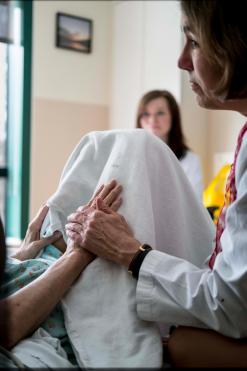Palliative care addresses each patient as a whole person, including his or her physical comfort, confidence, emotional well-being, spirituality, and dignity. Because family members are also involved in a person's illness, the palliative care team supports them and helps them feel informed as well.
Since no two people are alike, our team works closely with patients, their loved ones, and their clinicians. Taking into account the patient's personal values and treatment preferences, together we discuss and create a one-of-a-kind approach that includes what matters most to each individual.
Our vision
We envision a world in which attention to comfort and quality of life are integral within health care for people who are injured or ill as well as their families, and in which illness, caregiving, death and grief are accepted as normal, healthy aspects of the life of individuals, families and communities.
Mission
The Jack Byrne Center
The Jack Byrne Center for Palliative & Hospice Care provides short-term, inpatient palliative care. If you live in the Upper Valley area of New Hampshire or Vermont, the Jack Byrne Center is here to help you, close to home.
The Palliative Care Program is committed to improving comfort and quality of life for patients and families with life-limiting illness or injury and complex needs who are served by Dartmouth Hitchcock Medical Center, the Dartmouth Alliance, and providers in our region. The Palliative Care Program advances this mission through providing and modeling excellent clinical care, and through research, education (of ourselves, trainees and colleagues) and through participation in community-based efforts to improve access to and quality of palliative care in our region.
The Palliative Care Program is committed to excellence and conducts ongoing activities to identify patients in need of specialized palliative interventions and to continually improve quality of care and clinical services we provide. The team models best practices in care through the end of life, develops creative approaches to serving patients and families, and proactively identifies opportunities to use resources more effectively.
Supportive care and understanding
Our goal is to provide comprehensive, supportive care across all health care settings:
- At home
- During hospitalizations
- During transitions to hospice care
- In the outpatient clinic
Our palliative care team includes professionals and clinicians with diverse training, skills and talents. Each team member is experienced in counseling individuals and families through what can be the most difficult times in their lives.
The team includes:
- Specialized palliative care physicians, nurse practitioners, and nurses
- Skilled social workers and grief counsellors
- Healing arts practitioners
- Non-denominational spiritual care coordinator
- Carefully selected and trained volunteers from the community
- Creative Arts Specialists
Who benefits from palliative care?
Our team provides personalized services, resources and support for patients with a wide range of medical challenges.
Common types of patients we help include people living with:
- Cancer
- Cardiac issues (such as heart failure or heart valve issues)
- Complex surgical or medical issues requiring prolonged or repeated hospitalizations
- Neurological issues (such as stroke or ALS)
- Any serious medical illness that may significantly impact length or quality of life for the individual with the disease or their family
Patients usually receive palliative care services along with other medical treatments, such as intensive care, state of the art cardiac care, and specialty cancer care including innovative clinical trials. Palliative care is not the same as hospice services, and is usually utilized much earlier in the course of an illness. Palliative care delivered at the same time as other medical care has been shown to improve quality of life for the patient and caregivers, improve symptom management, and in some circumstances even improve survival.
Please see our Services page for a list of the services we provide to patients and families.
